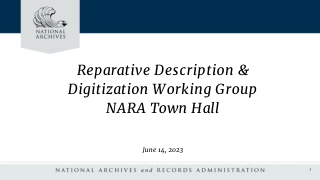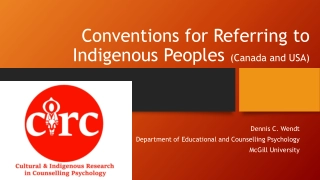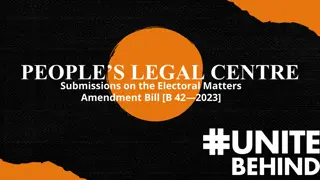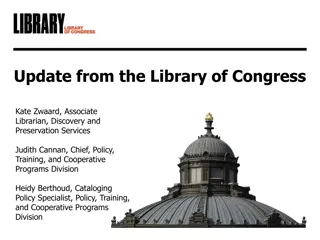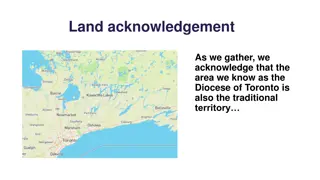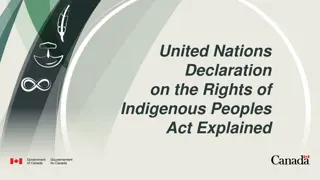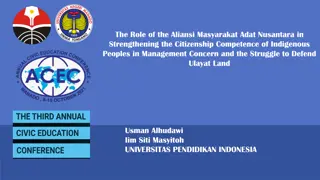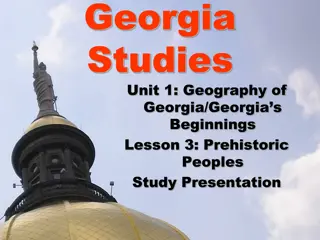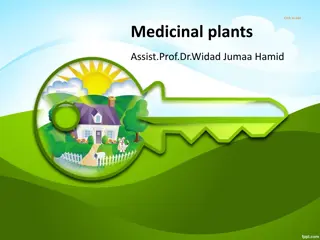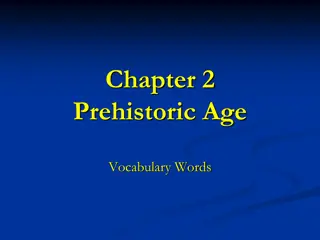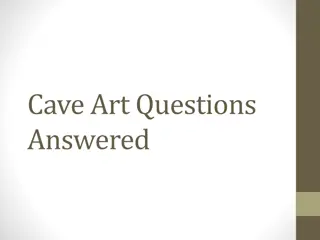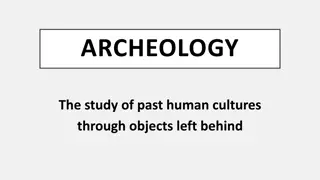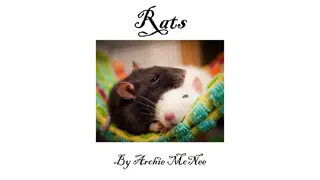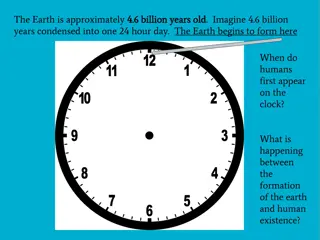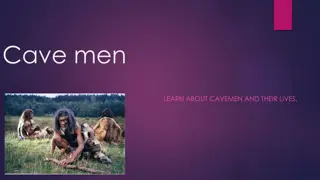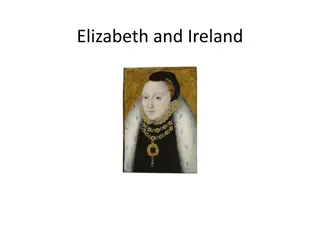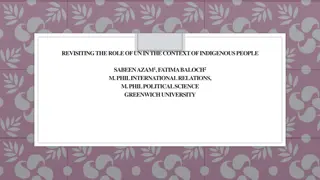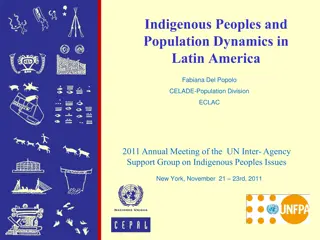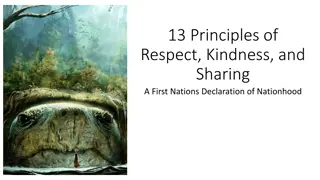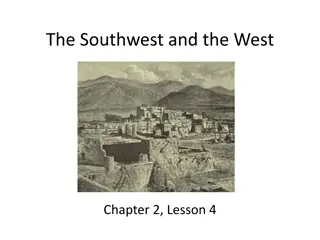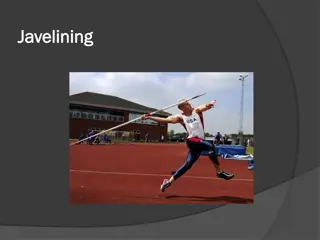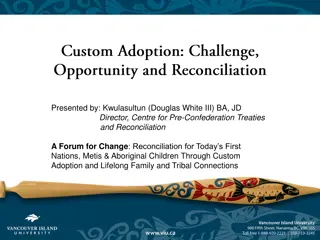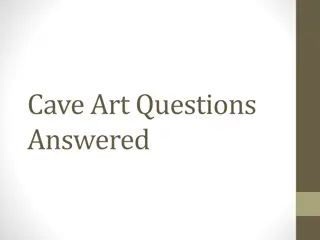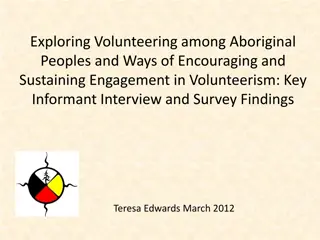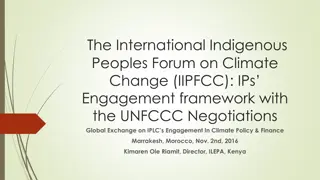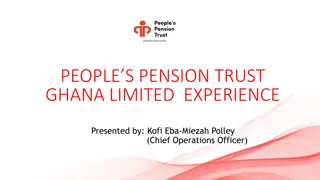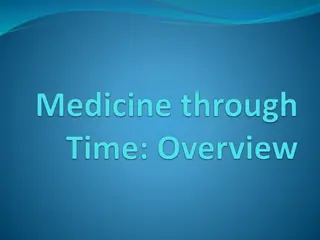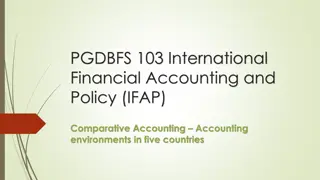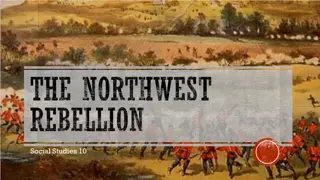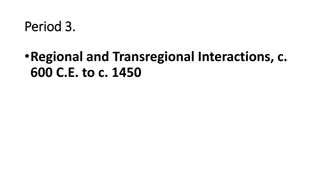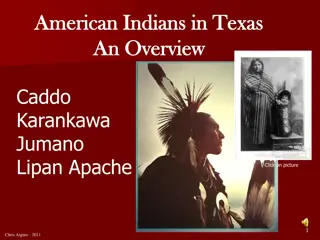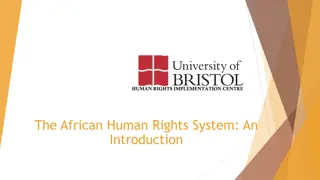Reparative Description & Digitization: Transforming Archive Practices
Join the NARA's Town Hall on June 14, 2023, featuring leaders in reparative description and digitization from NARA, Library of Congress, and more. Learn about innovative approaches and initiatives towards rectifying past errors in archival practices. Explore the commitment to respecting Indigenous p
2 views • 37 slides
Conventions for Referring to Indigenous Peoples in Canada and the USA
This article outlines guidelines for referring to Indigenous Peoples, emphasizing specificity and respect for preferred names and terms. It discusses the importance of capitalizing terms related to Indigenous Nations and cautions against using terms implying colonial possession. The use of terms lik
1 views • 24 slides
Exploring Fossils: Extensive Reading for Grade 6
Discover the world of fossils with this Grade 6 English lesson on extensive reading. Students will learn about fossils, museums, bones, nests, scientists, clues, and footprints. The lesson includes pre-reading activities, matching exercises for new words, reading passages about fossils, and comprehe
1 views • 21 slides
Peoples Legal Centre Submissions on Electoral Matters Amendment Bill
Peoples Legal Centre's submissions on the Electoral Matters Amendment Bill focus on increasing access to justice, deepening democratic participation, and advocating for a just and equal South Africa. The main themes include amendments on donations to political parties, regulations for independent ca
2 views • 17 slides
Update from the Library of Congress on Indigenous Peoples' Land Acknowledgment and Terminology Challenges
The Library of Congress recognizes the importance of acknowledging Native American land and is committed to rectifying incorrect and offensive subject headings for Indigenous peoples. Challenges in terminology and necessary changes are addressed to show respect for Native cultures.
1 views • 18 slides
Acknowledgement of Indigenous Territories in the Diocese of Toronto
The Diocese of Toronto acknowledges the traditional territories of the Anishnaabe, Haudenosaunee, and Wendat peoples, along with the Dish with One Spoon Wampum Belt Covenant. They express gratitude for Indigenous stewardship of the land, recognize historical injustices, and commit to fostering an ho
0 views • 8 slides
Fossil Plants: Sphenophyllum and Zygopteris Anatomy
Dr. Jithesh Krishnan R, Asst. Prof. at NSS College, Pandalam, specializes in studying Fossil Pteridophytes like Sphenophyllum and Zygopteris. These ancient plants date back to the Devonian period and showcase unique stem anatomy resembling roots. Sphenophyllum had slender shoots with whorled leaves,
0 views • 11 slides
Understanding the United Nations Declaration on the Rights of Indigenous Peoples Act
The United Nations Declaration on the Rights of Indigenous Peoples Act, effective from June 21, 2021, aims to protect and promote Indigenous rights, including self-determination and equality. Key elements include the preamble emphasizing reconciliation, interpretive elements in Section 2, and the de
1 views • 13 slides
History, Development, and Scope of Pharmacognosy
Pharmacognosy is the study of medicinal uses of crude drugs obtained from plants and natural resources. It involves researching physical, chemical, and biological properties of drugs from natural sources. The history of pharmacognosy dates back to prehistoric times, where the use of medicinal plants
0 views • 17 slides
Progress of UN-REDD Programme in Asia: Indigenous Peoples Participation
The UN-REDD Programme in Asia has made strides in engaging Indigenous Peoples in various missions and consultations since 2008. The formulation process includes scoping, programming, validation, and approval stages, with key milestones reached in countries like Papua New Guinea, Indonesia, and Vietn
4 views • 6 slides
Strengthening Indigenous Peoples' Citizenship Competence Through Aliansi Masyarakat Adat Nusantara
In the context of defending Ulayat land, the role of Aliansi Masyarakat Adat Nusantara (AMAN) is crucial in empowering Indonesian indigenous peoples with citizenship competence. This research explores the efforts of AMAN in enhancing indigenous community awareness, understanding, and education to st
6 views • 8 slides
Prehistoric Peoples of Georgia: Paleo, Archaic, Woodland, and Mississippian Periods
Explore the migration and lifestyles of ancient peoples in Georgia during the Paleo, Archaic, Woodland, and Mississippian periods. Discover their hunting techniques, living arrangements, cultural practices, and adaptation to changing environments. Unearth the fascinating history and evolution of pre
0 views • 8 slides
The Fascinating World of Medicinal Plants Through History
Explore the ancient origins and diverse uses of medicinal plants in treating diseases, from prehistoric times to modern societies. Discover how these natural remedies have played a crucial role in healthcare practices worldwide. Learn about the historical records, cultural significance, and scientif
1 views • 43 slides
Prehistoric Age Vocabulary Words and Concepts
Explore key terms and concepts related to the Prehistoric Age, including time period naming systems, cultural aspects, human evolution, agricultural practices, and societal organization. From defining BCE and CE to discussing artifacts, technology, nomads, and civilization, this collection offers in
0 views • 6 slides
Unraveling the Mysteries of Cave Art: Insights into Prehistoric Painting Techniques
Delve into the intriguing world of prehistoric cave art as we explore how ancient painters survived, communicated, and expressed themselves. Discover the significance of animal depictions, the materials used, and the ways in which early humans interacted with these remarkable artworks. Uncover the h
2 views • 8 slides
Unveiling the World of Archaeology
Delve into the fascinating realm of archaeology, a discipline that unravels ancient human cultures through artifacts and contexts. Explore the interplay of artifacts, culture, excavation methods, lithics, and more. Learn about the significance of preserving historical sites and the challenges posed
1 views • 11 slides
Discovering the World of Pet Rats
Explore the diverse world of pet rats, from different breeds like Dumbo Sphynx, Husky, and Rex, to remarkable stories of bravery like Magawa, the African giant pouched rat. Uncover the intriguing history of prehistoric rats and meet adorable companions like Fluffy and Sparkle with their unique likes
0 views • 7 slides
Exploring Human History Through Archaeology and Carbon Dating
The timeline of Earth's 4.6 billion years condensed into a single day offers a unique perspective on the emergence of humans around 200,000 years ago. The transition from Earth's formation to human existence highlights the vast timescale where communication without writing was dominant. By examining
0 views • 7 slides
Unveiling the Lives of Cavemen: A Glimpse into Prehistoric Times
Explore the fascinating world of cavemen as you delve into where they lived, what they ate, how they hunted, their clothing, and hygiene practices. Discover the mysteries of prehistoric times through the eyes of Mya and Leah, who share intriguing insights into the lives of our ancient ancestors.
0 views • 7 slides
History of Ireland and Queen Elizabeth I
Mesolithic hunter-gatherers migrated to Ireland in prehistoric times, followed by Celtic influence during the Iron Age. The history includes Viking raids, Henry II's arrival in Ireland, the Treaty of Windsor, the Great Charter of Ireland, the establishment of the First Irish Parliament, and events l
2 views • 22 slides
The Role of UN in Indigenous Peoples: A Critical Analysis
The research delves into the role of the United Nations in addressing the unique social, cultural, economic, and political qualities of indigenous peoples worldwide. It discusses the importance of recognizing indigenous rights, traditions, and the challenges they face in contemporary societies, emph
0 views • 7 slides
Indigenous Peoples and Population Dynamics in Latin America
Latin America is a region with diverse indigenous groups, facing demands for recognition and rights. The importance of information, especially from censuses, is crucial for developing policies and programs to support indigenous peoples. Various data sources such as censuses, surveys, and registries
0 views • 19 slides
Principles of Respect, Kindness, and Sharing: A First Nations Declaration
In this declaration, the author emphasizes the responsibility of First Nations as caretakers of their ancestral lands. It discusses the historical exclusion of First Peoples in the formation of Canada and calls for the recognition and preservation of Indigenous rights and sovereignty. The text highl
0 views • 16 slides
The Butterfly Effect in "A Sound of Thunder
In "A Sound of Thunder," the theme of cause and effect is vividly portrayed through the concept of the butterfly effect. The reckless character, Eckels, makes a fatal mistake when confronted by a T-Rex in a prehistoric setting, leading to catastrophic consequences. The story explores the fragility o
0 views • 6 slides
Indigenous Peoples of the Southwest and West: Adapting to Environment and Trade Networks
Indigenous peoples of the Southwest and West, such as the Pueblo, Navajo, Shoshone, Nez Perce, and Chumash, adapted to their environments by building adobe homes, utilizing trade networks for resources, and honoring their beliefs through ceremonial practices. They thrived by growing staple foods, hu
0 views • 6 slides
Role of Civil Society and Indigenous Peoples in Countering Cybercrime
Civil society and indigenous peoples play a crucial role in the implementation of the International Convention on Countering the Use of Information and Communications Technologies for Criminal Purposes at national levels. Cybercrime encompasses various activities, ranging from fraud and identity the
0 views • 15 slides
The Evolution of Javelins: From Ancient Warfare to Modern Sport
Javelins have a rich history dating back to prehistoric times, with evidence of their use by various cultures for hunting and warfare. African tribes and Norse men were known users of javelins, each with their own unique methods and purposes. Over time, javelins evolved from weapons of war to become
0 views • 10 slides
Addressing Intergenerational Crisis Through Custom Adoption and Legal Recognition
The presentation emphasizes the importance of recognizing ancestral laws and customs of Aboriginal peoples in addressing the intergenerational crisis faced by First Nations, Métis, and Aboriginal children. It explores the history of custom adoption, Indigenous traditions, and legal provisions. Focu
0 views • 28 slides
Overview of the African Commission on Human and Peoples' Rights
The African Commission on Human and Peoples' Rights was established to promote and protect human rights across Africa. The African Charter, which entered into force in 1986, emphasizes civil and political rights, including freedom from discrimination, equality, life, personal integrity, and various
0 views • 27 slides
Insights into Prehistoric Cave Art: Survival, Communication, and Symbolism
Cave painters navigated perilous environments to create vivid depictions of animals, possibly representing seasons and communication between early humans. They used locally sourced pigments, communicated non-verbally, and depicted scenes reflecting their world and society.
0 views • 8 slides
Understanding Volunteerism among Aboriginal Peoples
Exploring Volunteerism among Aboriginal Peoples focuses on key informant interview and survey findings regarding the perception, benefits, social outcomes, and challenges of volunteering within Aboriginal communities. The research delves into the cultural significance of volunteering, recruitment an
0 views • 21 slides
International Indigenous Peoples Forum on Climate Change (IIPFCC) Engagement Framework
The IIPFCC is a platform where indigenous peoples globally come together during UNFCCC negotiations to voice their concerns and shape outcomes. The forum provides a safe space for consensus-building on shared issues. Co-chaired by representatives from different regional groupings, the IIPFCC operate
0 views • 14 slides
Enhancing Social Security Coverage in Ghana: Peoples Pension Trust Experience
Ghana has historically focused on social security for formal workers, leaving the informal sector underserved. Efforts since the early 2000s to bridge this gap have faced challenges. Peoples Pension Trust has been a key player in trying to extend coverage to the informal sector. Various pension sche
0 views • 23 slides
Evolution of Medicine Through Time
Explore the historical progression of medicine from prehistoric times to the medieval era, focusing on societies like the Egyptians, Greeks, Romans, and beyond. Witness the transformations in surgical practices, disease management, and public health strategies across different civilizations, showcas
0 views • 14 slides
Accounting Environment in Peoples Republic of China (PRC)
The accounting environment in Peoples Republic of China (PRC) has undergone significant changes from a planned economy to a socialist market economy. With the emergence of private enterprises and foreign investments, the accounting profession has evolved as well. Guanxi, the concept of networks and
0 views • 22 slides
The Northwest Rebellion and Its Impact on Metis and Plains Peoples
The Northwest Rebellion in Canada during the late 19th century saw significant challenges faced by the Metis and Plains Peoples. The Metis struggled with broken promises of land, sparking anger and a call for ownership rights. In contrast, the Plains Peoples faced starvation as they became reliant o
0 views • 14 slides
Interactions and Movements in Period 3: 600-1450 CE
The period from circa 600 to circa 1450 CE was marked by significant regional and transregional interactions, including the expansion of communication networks, continuity and innovation of state forms, and increased economic productivity. The movement of peoples led to environmental and linguistic
0 views • 10 slides
Indigenous Peoples of Texas: Caddo and Karankawa Tribes Overview
Explore the rich history of the Caddo and Karankawa tribes in Texas. Learn about their way of life, including housing, food sources, and hunting practices. Discover how these indigenous peoples shaped the region.
0 views • 17 slides
Overview of the African Human Rights System
The African Human Rights System encompasses various key elements such as the Organisation of African Unity, African Charter on Human and Peoples' Rights, African Court on Human and Peoples' Rights, African Union, and additional human rights-related treaties and protocols. This system aims to protect
0 views • 19 slides
Ancient Civilizations and Historical Figures Overview
Explore the early eras of human history, from prehistoric times and the Old Stone Age to the rise of ancient cities like Catal Huyuk. Learn about the significance of scribes, nomads, and the Paleolithic period. Delve into the realms of archeology, Neolithic advancements, polytheism, and bureaucratic
0 views • 20 slides
